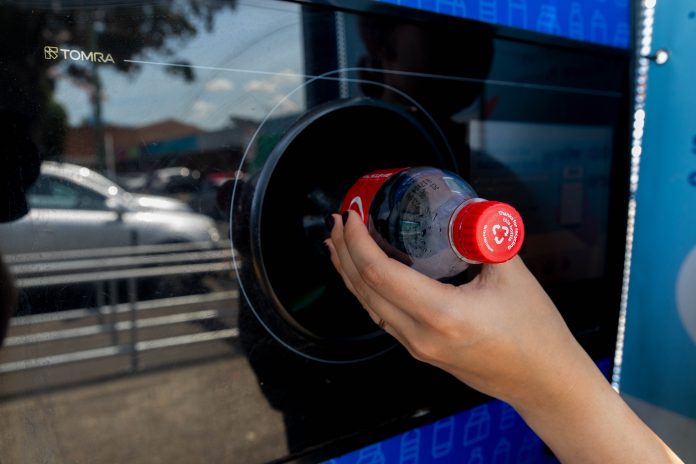New research by Coca-Cola Australia reveals the majority of Australians (97%)[1] in participating states are aware of container deposit schemes and the 10cent return, however, the environmental benefits they offer are less known.
In line with this year National Recycling Week theme, ‘Waste isn’t waste until it’s wasted’, Coca-Cola Australia and Planet Ark are highlighting the benefits of recycling through container deposit schemes.
“Container deposit schemes (CDS) produce clean, recyclable materials that are not mixed in with other packaging. This means the materials avoid contamination and have the best chance of being recycled again.” CDS are now available in the majority of states across Australia (NSW, QLD, WA, NT, ACT, and soon to be VIC and TAS) offering 10 cents for every bottle and can returned.
“Recycling via CDS helps reduce the amount of new plastic produced in Australia, this means using less fossil fuels and therefore has a lower carbon impact.”
A CSIRO report released this year found reductions in plastic pollution in areas with beverage container schemes and with strategies that economically motivated appropriate waste disposal. “The report also found an average reduction in coastal litter of 29% over six years (2013-2018) across Australia.[2]
“With 72% of Australians stating they do not currently regularly recycle via CDS, there are significant additional financial and environmental opportunities that can be tapped into through increased use of CDS.”
Planet Ark co-CEO Paul Klymenko says, “Beverage containers are in a unique position because they are the only product category with a recycling scheme, where consumers get money back for every container they return.
“The schemes have proven to be successful in keeping plastic out of landfill and waterways. However, many people are not aware that they also offer additional environmental benefits as the clean material stream gives returned bottles the best chance of becoming another bottle, reducing the amount of new plastic used in Australia.
“We are thrilled to continue our work with Coca-Cola Australia for this year’s National Recycling Week as we collaborate to encourage Australians to recycle, including through CDS,” Mr Klymenko said.
The research commissioned by Lonergan revealed almost all Australians (95%) have something that would motivate them to engage with the schemes, with environmental factors cited as the top reason.
- Amongst those with CDS in their state/territory, three quarters (76%) have used them, and only 3% of Australians (in CDS states) had never heard of CDS schemes.
- Just over one in four (28%) regularly use them, despite the environmental and financial benefits.
- Seven in ten Australians who have used CDS before do so because of environmental factors (68%), including limiting landfill (56%), reducing the impact on marine life and wildlife (35%), and helping to reduce climate impact (33%).
- The biggest individual motivator to use CDS is the 10 cents return (58%).
- The practicalities of storing (31%) and transporting (20%) bottles and cans were identified as key barriers for Australians to use CDS.
- Baby boomers are the least likely to use CDS regularly (25%), most likely is Gen Z (36%).
“We understand there can be challenges around convenience when using CDS, however, with schemes continuing to expand nationally and communities coming up with creative solutions, we believe these barriers will reduce. Through National Recycling Week, we hope to help raise awareness of the cumulative impact individual actions can have, no matter how small each contribution may feel,” Mr Klymenko said.
Coca-Cola Australia Director of Public Affairs, Communication and Sustainability Natalie Helm says, “We are strong supporters of container deposit schemes across Australia, which enable our bottles to be collected and recycled, giving them the best chance of becoming a bottle again. This ultimately means less new plastic is generated, which in turn has a lower carbon impact.”
States with an operating CDS have reported significant benefits including:
- NSW: $35 million returned to charities and community groups via donations and fees
- WA: 821 local jobs created (including 187 for disadvantaged people, and 77 Aboriginal and Torres Strait Islanders) at the 260 refund points across the state
- QLD: 48 per cent reduction in beverage container litter across the state
- SA: beverage containers account for less than 3 per cent of litter items
- ACT: More than 200 million containers have been returned
- NT: $10 million in refunds paid out last year alone.
Coca-Cola’s sustainability commitment
As part of its ‘World Without Waste’ vision, Coca-Cola has a global ambition to help collect and recycle the equivalent of every bottle and can they sell by 2030. Coca-Cola continues to innovate its packaging, with seven in 10 plastic bottles in Australia made from 100 per cent recycled plastic (excluding caps and labels).
“The vision to help our bottles become a bottle again is now one step closer with our bottler Coca-Cola Europacific Partners (CCEP) co-partnering in a PET plastic recycling facility, right here in Australia. A second facility will be operational in Altona Victoria in 2023, further expanding our capacity to recycle 2billion PET bottles per year through both sites. Through our environmental partnerships with organisations such as Planet Ark, our support of CDS and our investments in recycling and infrastructure, we hope to create a real circular economy for our packaging in Australia,” Ms Helm said.
For more information about National Recycling Week, visit https://planetark.org/programs/national-recycling-week.
[1] Lonergan research for Coca-Cola Australia 2022 of 1,038 18+ year olds
[2] CSIRO Report (2022): https://doi.org/10.1016/j.oneear.2022.05.008.





